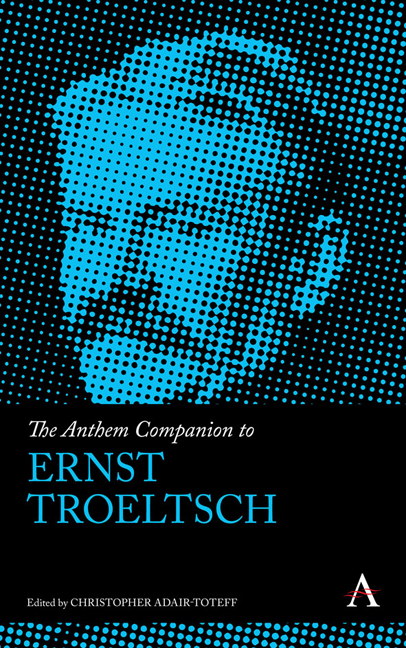Book contents
- Frontmatter
- Contents
- Introduction Ernst Troeltsch: Theologian, Sociologist, Philosopher, and Culture Critic
- Chapter One The Independence of Religious Phenomena: The Work of Ernst Troeltsch as a Template for the Study of Religion
- Chapter Two Troeltsch on Protestantism and Modernity
- Chapter Three Church, Sect, Mysticism: Writing the History of Christianity
- Chapter Four Troeltsch's Personalism
- Chapter Five Performative Practice: Ernst Troeltsch's Concept(s) of Christianity
- Chapter Six Troeltsch and the Problem of Theological Normativity
- Chapter Seven Troeltsch as Dogmatic Theologian
- Chapter Eight Ernst Troeltsch and the Problem of Historicism
- List of Contributors
- Index
Chapter Three - Church, Sect, Mysticism: Writing the History of Christianity
Published online by Cambridge University Press: 10 May 2018
- Frontmatter
- Contents
- Introduction Ernst Troeltsch: Theologian, Sociologist, Philosopher, and Culture Critic
- Chapter One The Independence of Religious Phenomena: The Work of Ernst Troeltsch as a Template for the Study of Religion
- Chapter Two Troeltsch on Protestantism and Modernity
- Chapter Three Church, Sect, Mysticism: Writing the History of Christianity
- Chapter Four Troeltsch's Personalism
- Chapter Five Performative Practice: Ernst Troeltsch's Concept(s) of Christianity
- Chapter Six Troeltsch and the Problem of Theological Normativity
- Chapter Seven Troeltsch as Dogmatic Theologian
- Chapter Eight Ernst Troeltsch and the Problem of Historicism
- List of Contributors
- Index
Summary
Introduction
Ernst Peter Wilhelm Troeltsch (1865– 1923) was one of the most influential intellectuals of the late Wilhelmine Empire and the early Weimar Republic. Although he was trained as a theologian, his interests were much wider. His voluminous study The Social Teaching of the Christian Churches (1912) is considered to be one of the landmarks of early sociology and the typology “church- sect- mysticism” is a staple element in sociology handbooks until the present day. Much of his work was concerned with the position of religion in the Western world. History was not pursued for its own sake but in favor of a better understanding of actual problems. His well- known dictum that “history has to be overcome by history” implied an active political commitment as well. Troeltsch supported the new order after the breakdown of the Kaiserreich and became assistant secretary of state in the Ministry of Education and Science in the Weimar Republic.
In this contribution I show how the typology “church- sect- mysticism” functioned in Troeltsch's thought and in his writing of the history of Christianity in particular. The typology as it has been developed by Troeltsch and his colleague Max Weber in the first decade of the twentieth century has had an enormous impact, foremost in the sociology of religious organizations. “Time and again Troeltsch's presentation has been ritually invoked and often slaughtered— and accomplishment of such is probably one of the earliest rites of passage which sociology- of- religion neophytes have to undergo.” In Troeltsch's work, however, the typology plays a much more complex role, and it is fascinating to see how he develops and refines the types in his monumental work on the Social Teaching of the Christian Churches. Because the historical context played a crucial role in Troeltsch's sociological thinking, the influential American sociologist Talcott Parsons has called him “perhaps the most eminent sociologically oriented historian of Western Christianity.”
The Social Teachings, which was published in English in 1931, deals— as the title already indicates— with the social teachings or social philosophy of Christianity throughout the ages. Because of its individualistic and eschatological character, early Christianity had basically no social philosophy of its own, in Troeltsch's view. The early Christians had to find their views elsewhere and adapted Stoic natural law.
- Type
- Chapter
- Information
- The Anthem Companion to Ernst Troeltsch , pp. 55 - 70Publisher: Anthem PressPrint publication year: 2017



